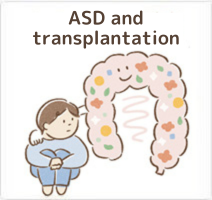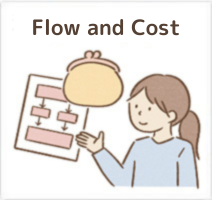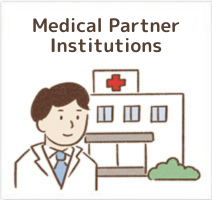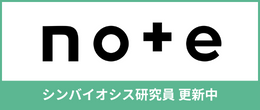Autism spectrum disorder (ASD) is a developmental disorder characterized by difficulties with interpersonal relationships and strong preoccupations.
We have begun an effort to objectively identify behavior before and after transplantation using multiple methods.
ASD and transplantation
The number of cases of ASD is increasing every year in Japan and abroad.
The gut is also called the “second brain,” and it is known that there is a relationship between the gut and the brain. This gut-brain correlation is called the “gut-brain axis. Recently, it has been discovered that the bacteria in the intestines, namely the gut microbiome, are responsible for the gut-brain axis, and the “gut-brain axis” is now also referred to as the “gut microbiome-intestinal tract-brain axis”.
Coupled with these developments in the medical sciences, many studies have been reported suggesting that ASD symptoms are associated with the gut microbiome via various pathways. Furthermore, it has been reported that the diversity of the gut microbiome is low in people with ASD, and treatment methods to increase the diversity of the gut microbiome are now under investigation. As a methodology, “fecal transplant” has been taken up, and exploratory clinical studies for the treatment of ASD are now being conducted.
Although there is no research on the treatment of ASD by “fecal transplant” in Japan, exploratory clinical studies have been conducted overseas at the University of Arizona and the Third Military Medical University of China, using existing methods.
At the University of Arizona, “fecal transplant” was performed on 18 patients with ASD, and improvement of ASD symptoms was observed in approximately 40% of the patients. Adverse events were minor. However, this method requires strict conditions for people with ASD, such as a 2-week series of antimicrobials before the transplantation. On the other hand, the Third Military Medical University performed “fecal transplant” using 40 ASD patients. Adverse events were minor, and about 60% of the patients showed improvement in ASD symptoms by 4 weeks after FMT. However, the effect of FMT tends to diminish with the passage of time.
Through the results of treatment conducted so far at several medical institutions belonging to the Association for Clinical Research of Fecal Microbiota Transplantation Japan, we have obtained results suggesting that fecal transplant can be an effective methodology for children with ASD.
Flow and cost
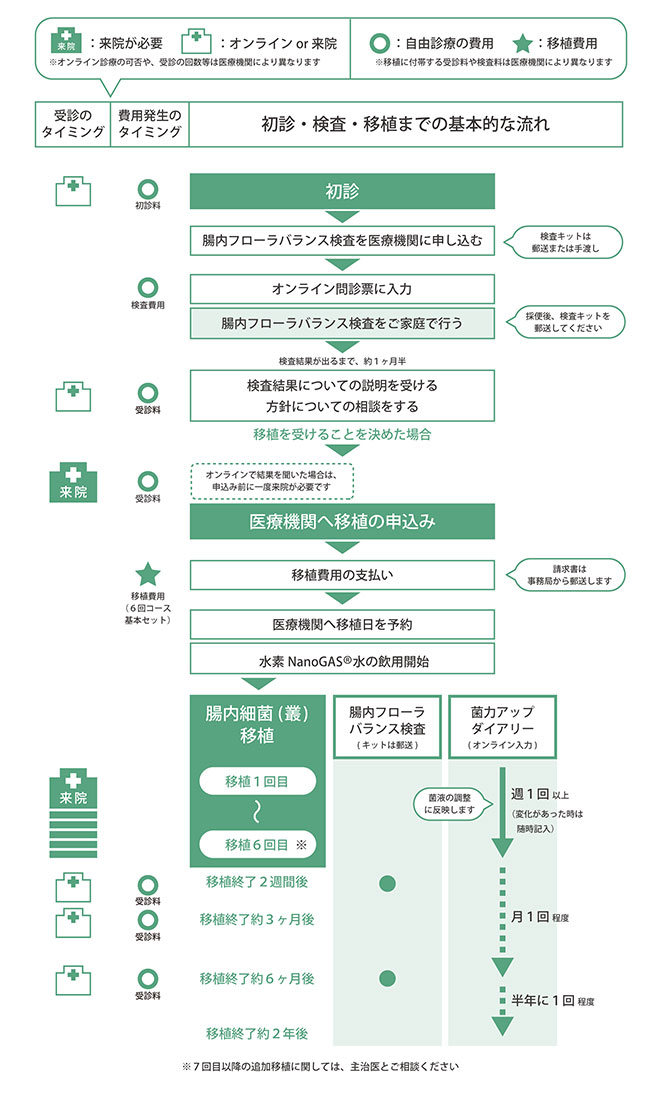
*ASD bacterial power up diary
We will use this information as a reference for adjusting the bacterial solution, so please enter any changes in your daily activities. (You can use your computer or smartphone to enter your data.)
Please enter the time when you wake up, sleep, eat meals, have bowel movements, change mood, etc.
Please enter any changes in behavior, such as tantrums or obsessions, in the free-entry field.
<!–・お答えいただく方の年齢は問いません。–>
For more information about the cost of fecal transplant, click here.
[Initiatives for children of junior high school age and younger]
The following tests and measurements are available free of charge to visualize pre- and post-transplant behavior. Parents will receive feedback on SRS-2 test results every 6 months after the completion of transplantation.
▼ Questionnaire-type test to be answered at home
SRS-2 (Interpersonal Responsiveness Scale Checklist) ⇒Paper checksheet sent by mail
GSRS (Gastrointestinal Symptom Checklist) ⇒ Paper checklist sent by mail
PHQ-4 (Patient Health Questionnaire 4) ⇒ Paper checklist sent by mail
*One each before and after transplantation, once a month for 6 months after transplantation, and about once every 6 months three times thereafter for a total of 11 times.
▼ Examinations performed at the time of consultation at a medical institution
Gazefinder eye tracking device
*Two times: once each before and after transplantation
Click here for details on various inspections
Benefits of Inspection and Measurement
This data can be used to help parents and physicians share a common understanding of the child’s characteristics.
It is useful to objectively understand the child’s behavior before and after transplantation based on multiple indices.
We are working to verify the safety and efficacy of fecal transplant with the aim of alleviating the problems associated with autism spectrum disorder.
*Because of age restrictions depending on the test, we are targeting children under junior high school age.
Medical facilities where transplants can be performed
These are medical institutions where fecal transplant is available.
All medical institutions use the same fecal transplant solution manufactured by the Association for Clinical Research of Fecal Microbiota Transplantation Japan, and the treatment methods are the same.
*In addition to the transplantation fee, there are separate fees for consultation with a specialist (transplantation consultation, nutritional guidance, etc.) and testing.
- Kanto region (including Tokyo, Kanagawa, Saitama, Gunma, Tochigi and Chiba prefectures)
- Chubu region(including Aichi, Nagano, Shizuoka, Niigata, Toyama, Ishikawa and Fukui prefectures)
- Kansai region (south-western half of Japan, including Osaka)
- Chugoku region
- Kyushu/Okinawa Region
Kanto region (including Tokyo, Kanagawa, Saitama, Gunma, Tochigi and Chiba prefectures)
Tokyo metropolitan area
Futamatakai Medical Corporation Natural Art Clinic
(integrative medicine, nutritional therapy, internal medicine, pain clinic)
Postal Code 102-0085
Android Building 2F, 6-5 Rokubancho, Chiyoda-ku, Tokyo
03-6256-8448

- Consultation fee: 5,500 yen (including tax)/15 minutes *First-time patients will be charged a separate registration fee of 3,300 yen (including tax) for the first visit.
- Nutritional guidance: yes, Psychological counseling: yes
- Features: nutritional therapy (orthomolecular, supplement therapy), functional medicine, IV therapy, dietary guidance, natural hormone therapy, hydrogen therapy, natural herbal therapy, chelation therapy (detoxification), Ayurveda, far-reaching therapies, Yamamoto New Scalp Acupuncture (YNSA), plasma therapy
Base Clinic Akasaka
(Psychosomatic medicine, psychiatry, allergy)
7th floor, Tameike Mitsuwa Building, 2-10-15 Akasaka, Minato-ku, Tokyo 107-0052
none
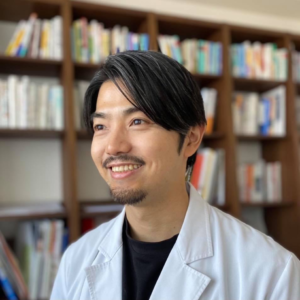
- Consultation fee: 8,800 yen/30 minutes (tax included)
- Nutritional guidance: Available
- Features: Based on the concept of "health from the base of mind and body," this clinic aims to achieve fundamental improvement, not just prescribing medicine for symptoms. For physical and mental disorders, you can receive treatment tailored to your needs, including nutritional therapy, TMS (transcranial magnetic stimulation), and infusion therapy.
Chubu region(including Aichi, Nagano, Shizuoka, Niigata, Toyama, Ishikawa and Fukui prefectures)
Nagano prefecture (Chuubu area)
Medical Corporation Lagom Life Clinic Tateshina
(Internal medicine, gastroenterology, pediatrics)
Postal Code 391-0213
3317-1 Toyohira, Chino-shi, Nagano, Japan
0266-77-2050

- Consultation fee: The initial consultation fee is 5,100 yen (all prices below include tax) for a maximum of 30 minutes. An additional consultation fee of 3,100 yen per 15 minutes will be charged for an extension of consultation time.
Aichi prefecture (Chuubu area)
Medical Corporation Keimeikai Kimura Hospital
(Gastroenterology, orthopedics, dermatology)
Nagoya, Aichi 465-0087, Japan
2-22-1, Meitohondori, Meito-ku, Nagoya-shi, Aichi, Japan
052-781-1119
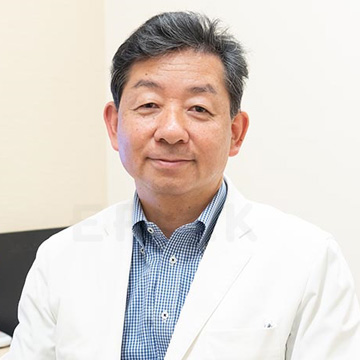
- Consultation fee: 5,500 yen (tax included)/30 min.
- Nutritional guidance: Yes
- Features: Primary care (from prevention to rehabilitation) in the community
Kansai region (south-western half of Japan, including Osaka)
Osaka metropolitan area
Medical Corporation Jizenkai Tanaka Clinic
(Internal medicine, cardiology, allergies, physiatry)
2-3-8, Ikuno-nishi, Ikuno-ku, Ikuno-ku, Osaka-shi,
Osaka 544-0024
06-6711-3770
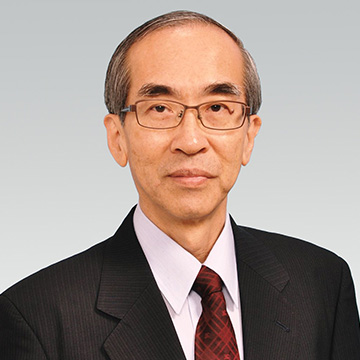
- Consultation fee: 8,800 yen (tax included)
- Nutritional guidance: Yes
- Features: nutritional therapy, supplement prescription, intravenous therapy, immunotherapy
Medical Corporation Yuakai Kawai Internal Medicine Clinic
(Internal medicine and gastroenterology)
Postal Code 536-0023
3-7-14 Higashinakahama, Joto-ku, Osaka-shi, Osaka
06-6962-3133
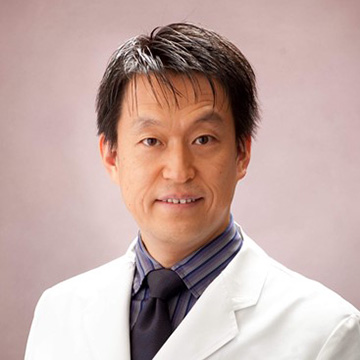
- Consultation fee: 8,800 yen (tax included)
- Online: Yes
- Nutritional guidance: Yes
- Features: Gastrointestinal and colonoscopy available
Medical Corporation Haruna Clinic
(Pediatrics, allergies, internal medicine)
Osaka, Japan 532-0006
Room 202, Core Wing Aoyama, 1-3-13 Nishimikuni, Yodogawa-ku, Osaka-shi, Osaka
06-4807-5130

- Consultation fee: 5,500 yen (tax included)/20 minutes *Additional fee for every 10 minutes ( Refer to the website )
- Online: Yes
- Nutritional guidance: Yes
- Characteristics: Female doctor. We see both children and adults with allergic diseases such as atopic dermatitis, developmental disorders, adrenal fatigue, and other conditions that are not easily improved by western medicine. We also provide biomedical treatment and biomedical testing using Chinese herbal medicine, diet and lifestyle guidance, acupuncture, supplements, etc.
Hyogo prefecture (Kinki area) (Hyougo)
Luke's Ashiya Clinic
(Internal medicine, gastroenterology, psychosomatic medicine)
Postal Code 659-0092
2F Moo Building, 8-2 Oharacho, Ashiya-shi, Hyogo, Japan
0797-23-6033
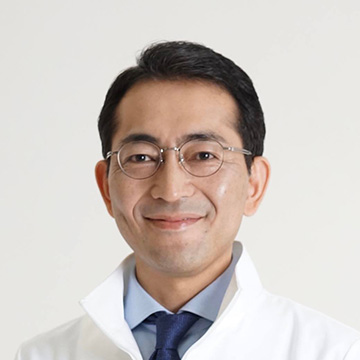
- Consultation fee: 22,000 yen (tax included) / 1 hour * AGEs measurement and InBody measurement are performed.
- Online: Yes
- Nutritional guidance: yes, Psychological counseling: yes
- Characteristics: in addition to nutritional therapy based on molecular nutrition, IV therapy, hydrogen therapy (intravenous drip), reduced electron therapy, psychotherapy (cognitive behavioral therapy, Simonton therapy, box garden therapy, EMDR, etc.), etc.
Chugoku region
Tottori prefecture (Chuugoku area)
Medical Corporation Ishinkai Yorozu Clinic
(Internal medicine, gastroenterology, cancer integrative oncology gastroenterology)
Postal Code 689-0202
1-118-4, Mihagino, Tottori City, Tottori Prefecture
0857-59-0433

- Consultation fee: 4,950 yen (tax included)
- Nutritional guidance: yes, Psychological counseling: yes
- Characteristics: Can be implanted after endoscopy or intestinal cleansing with a special machine.
Kyushu/Okinawa Region
Fukuoka prefecture (Kyushu)
Medical Corporation Kiwakai Kitamura Clinic
(Gastroenterology, surgery, oncology)
4-3-8 Nishiki-cho, Onojo-shi, Fukuoka 816-0935
092-581-6640
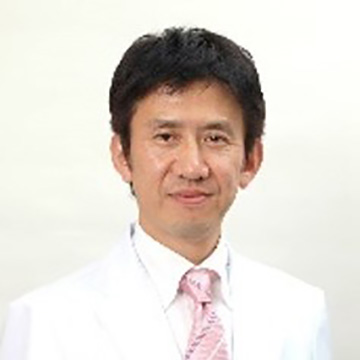
- Consultation fee: Please contact Kitamura Clinic directly.
Kumamoto prefecture (Kyushu)
Grace Medical Clinic
(Internal medicine, pediatrics, cardiology)
Postal Code 862-0916 1-16-36
Sadohara, Higashi-ku, Kumamoto-shi, Kumamoto
096-360-9013
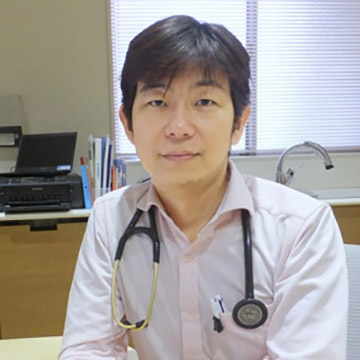
- Consultation fee: 5,500 yen (tax included)/30 min.
- Online: Yes
- Nutritional guidance: Yes
- Features: nutritional therapy, supplement prescription, intravenous therapy,
immunotherapy, gastrointestinal and colonoscopy, etc.
Facilities where transplant consultation is available
These are consultation facilities where you can ask questions about transplants, determine whether transplants are right for you, and discuss other issues from the perspective of your field of expertise.
Please note that we may not be able to respond to inquiries outside of our field of expertise.
Kanto region (including Tokyo, Kanagawa, Saitama, Gunma, Tochigi and Chiba prefectures)
Saitama prefecture (Kantou area)
Family Chiropractic Clinic
(Chiropractic)
Postal Code 349-0111
Ebisuya Bldg. 1F, 3-1-25 Higashi, Hasuda-shi, Saitama
0120-42-1818
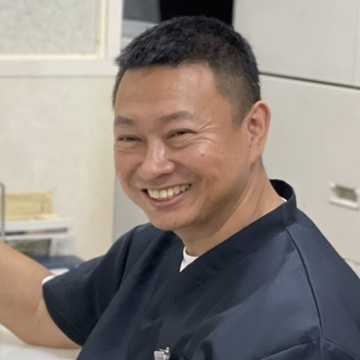
Kansai region (south-western half of Japan, including Osaka)
Osaka metropolitan area
Koide Clinic
(Psychosomatic medicine, neurology, nutritional therapy)
Postal Code 543-0056
6F Daishin Building, 16-10 Horikoshi-cho, Tennoji-ku, Osaka-shi, Osaka
06-6771-7525
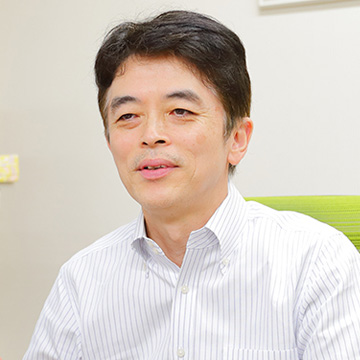
Read testimonials
Here you will find stories and interviews with patients and families who have undergone transplants. Due to differences in age and individual characteristics, changes resulting from transplantation vary. We are happy to share our family members’ and personal experiences and insights with the medical community. We believe that subjective records are very important. At the same time, we are working to objectively record changes, believing that the accumulation of verification that goes beyond personal impressions will pave the way to establishing this as a medical treatment.
Read about the transplant experience
What is a specific clinical research initiative? ※Finished
Specific clinical research refers to studies in which patients participate and cooperate to investigate the safety and efficacy of therapeutic and diagnostic methods. Many of the therapeutic and diagnostic methods currently in use have also been advanced through clinical research in Japan and abroad. More than 50 people with autism spectrum disorder have already undergone gut microbiota transplantation since 2018 by clinicians belonging to the Association for Clinical Research of Fecal Microbiota Transplantation Japan. In order to establish this as a medical treatment that more people can receive with peace of mind, we are collaborating with universities and attempting to scientifically elucidate the safety and effectiveness of gut microbiota transplantation for autism spectrum disorder. The results of various tests are used as a reference for better transplantation by quantifying the changes before and after transplantation for each individual. We will continue to work diligently to link the accumulation of those results to new treatment methods.
Click here to see the various tests we offer free of charge to children under junior high school age.
This is a questionnaire-type test to be answered at home.
SRS-2 (Interpersonal Responsiveness Scale Checklist) ⇒Paper checksheet sent by mail
GSRS (Gastrointestinal Symptom Checklist) ⇒ Paper checklist sent by mail
PHQ-4 (Patient Health Questionnaire 4) ⇒ Paper checklist sent by mail
*One time each before and after transplantation and once a month until 6 months after transplantation, and about once every 6 months after 6 months, for a total of 11 times.
Measurements are taken at the time of the visit at the medical facility.
Gazefinder® eye-tracking system
*Two times: once each before and after transplantation
WHAT IS SRS-2?
The SRS-2 Interpersonal Responsiveness Scale is a test that assesses interpersonal, communication, and repetitive/emotional behaviors that are characteristic of autism spectrum disorders in subjects ranging from 2.5 years old to adults.
Parents, teachers, and others familiar with the subject’s daily life answer the questions, and the examiner scores the answers.
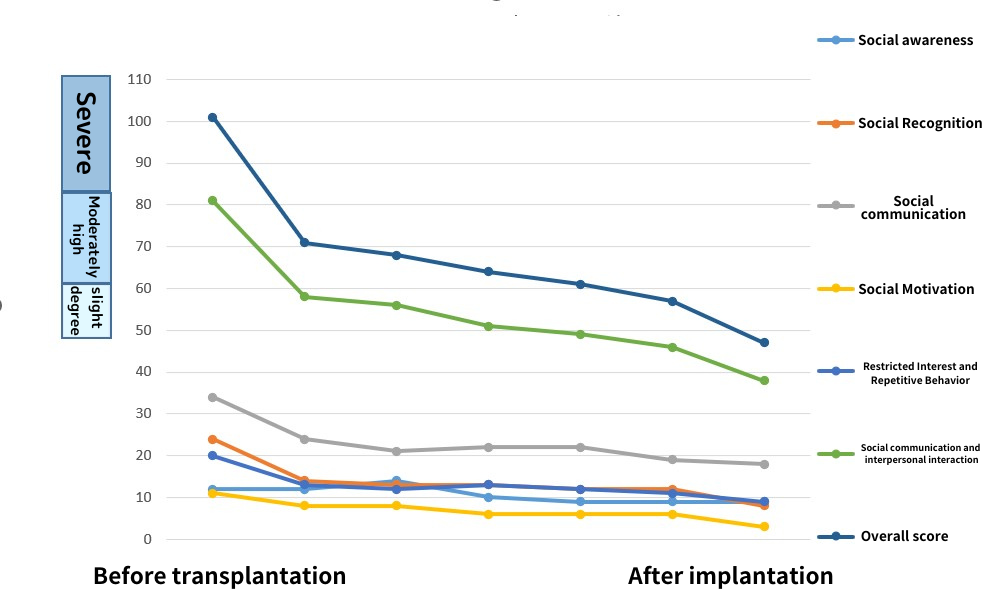
What is the Gazefinder eye tracking system?
Image of measurement with Gazefinder
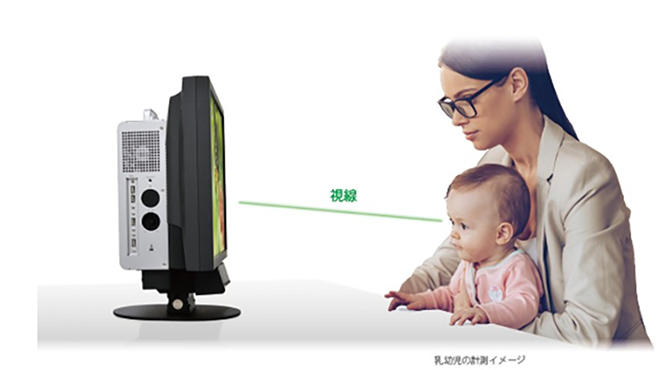
Gazefinder is a device that objectively evaluates the characteristics of children with ASD by measuring eye movement. Since it only requires viewing a video projected on a monitor screen, even small children can be measured, and it is used in research on ASD and other disorders.
In our research group, we use Gazefinder to quantitatively evaluate behavior before and after transplantation.
Gazefinder measurement data before and after gut microbiota transplantation
The viewpoints that could be measured are shown as blue dots. After transplantation (lower portion), the patient is able to see people’s eyes and mouths clearly; ASD diagnostic criteria include difficulty with eye contact interactions and discrimination of gaze direction. In the data below, before the transplantation (top), the patient barely looked at the eyes. But after the transplantation (bottom), a change in gaze direction occurred, with the patient looking at the eyes and looking at the mouth. This is a significant change for people with ASD, who often say they feel discomfort and stress when making eye contact with others.</
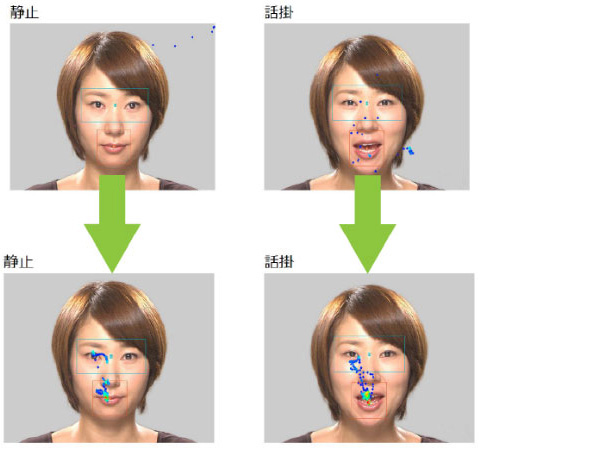
What is the gut flora balance test?
The gut flora balance test is a method to estimate the species of bacteria living mainly in the intestinal tract by reading the nucleotide sequence of the part containing the genetic information (16SrRNA gene) of the microorganisms in the feces using the latest genetic analysis device called a next-generation sequencer and comparing it with a bacterial group classification database. The method is as follows.
For the intestinal flora balance test, you will be asked to use the stick-type test kit at home and scoop out the stool so that the brush portion is covered with stool. Please return the test kit in the return bag by mail. By taking this test before and after your transplant, we can tailor a transplant plan to your individual condition.
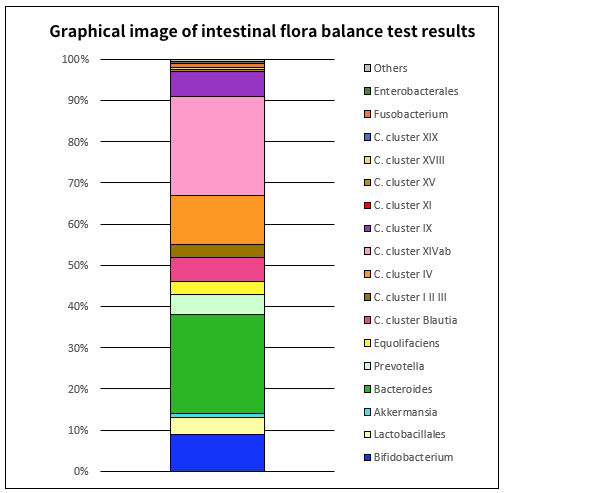
Learn more in the video
Interviews with parents, case reports and seminars by physicians, and monthly "Loose bacteria and Roundtable Discussions" are available on Youtube.
Watch the short video on YouTube.
Watch the roundtable discussion on Loose bacteria on YouTube.








